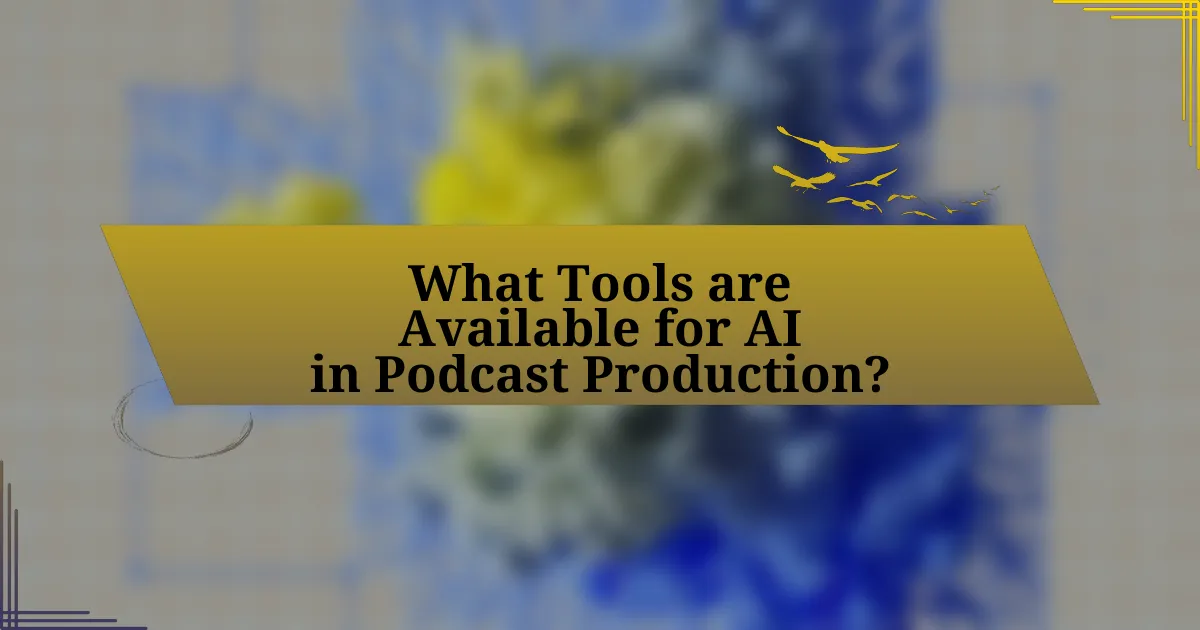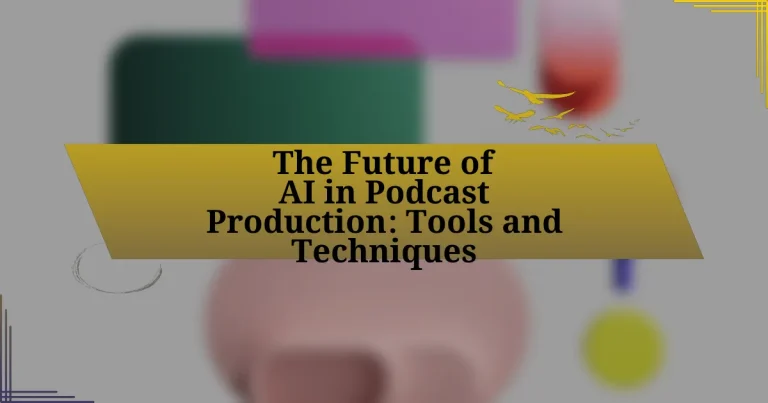The article focuses on the future of artificial intelligence (AI) in podcast production, highlighting its role in enhancing automation, content personalization, and audio editing capabilities. It discusses how AI technologies, such as natural language processing and machine learning algorithms, are transforming the podcasting landscape by streamlining production processes and improving content quality. Key AI tools like Descript and Auphonic are examined for their functionalities in audio editing and transcription, while challenges related to content quality, ethical considerations, and audience engagement are also addressed. The article concludes with insights into emerging trends and best practices for integrating AI into podcast workflows, emphasizing the potential for increased efficiency and audience retention.

What is the Future of AI in Podcast Production?
The future of AI in podcast production is characterized by enhanced automation, improved content personalization, and advanced audio editing capabilities. AI technologies are increasingly being integrated into podcasting tools, enabling creators to streamline production processes, such as automatic transcription and editing, which significantly reduces the time required to produce high-quality episodes. For instance, AI-driven platforms like Descript and Auphonic utilize machine learning algorithms to simplify audio editing and enhance sound quality, allowing podcasters to focus more on content creation rather than technical aspects. Additionally, AI can analyze listener preferences and behaviors, enabling personalized content recommendations that can increase audience engagement and retention. This trend is supported by the growing adoption of AI tools in the media industry, indicating a shift towards more efficient and tailored podcast production methods.
How is AI transforming the podcast production landscape?
AI is transforming the podcast production landscape by automating various aspects of content creation, editing, and distribution. Tools powered by AI, such as automatic transcription services and audio enhancement software, significantly reduce the time and effort required for producers to create high-quality podcasts. For instance, AI-driven platforms can analyze audio files to remove background noise and optimize sound quality, which enhances listener experience. Additionally, AI algorithms can assist in content curation by analyzing listener preferences and suggesting topics or formats that are likely to engage audiences. This shift not only streamlines the production process but also allows creators to focus more on storytelling and creativity, ultimately leading to a more diverse and innovative podcasting ecosystem.
What are the key AI technologies influencing podcast production?
Key AI technologies influencing podcast production include natural language processing (NLP), machine learning algorithms, and automated audio editing tools. NLP enables transcription and content analysis, allowing creators to generate show notes and enhance discoverability. Machine learning algorithms assist in audience analysis and content personalization, helping producers tailor episodes to listener preferences. Automated audio editing tools, such as Adobe Audition’s AI features, streamline the editing process by removing background noise and optimizing sound quality, significantly reducing production time. These technologies collectively enhance efficiency, improve content quality, and facilitate audience engagement in podcast production.
How does AI enhance the efficiency of podcast production processes?
AI enhances the efficiency of podcast production processes by automating tasks such as audio editing, transcription, and content generation. For instance, AI-driven tools can analyze audio files to remove background noise and optimize sound quality, significantly reducing the time required for manual editing. Additionally, AI transcription services convert spoken content into text quickly and accurately, facilitating easier content repurposing and accessibility. Research indicates that AI can cut production time by up to 50%, allowing creators to focus more on content quality and audience engagement rather than technical details.
What challenges does AI face in podcast production?
AI faces several challenges in podcast production, including content quality, contextual understanding, and audience engagement. Content quality is often compromised due to AI’s limitations in generating nuanced and creative narratives, which are essential for captivating storytelling. Contextual understanding is another significant hurdle, as AI may struggle to grasp the subtleties of human conversation, leading to misinterpretations or irrelevant content. Additionally, audience engagement is challenging because AI-generated content may lack the emotional resonance and personal touch that human hosts provide, making it difficult to build a loyal listener base. These challenges highlight the need for ongoing advancements in AI technology to enhance its effectiveness in podcast production.
What ethical considerations arise with AI in podcasting?
Ethical considerations in AI podcasting include issues of transparency, bias, and intellectual property. Transparency is crucial as audiences need to know when AI-generated content is being used, which affects trust. Bias can arise from the data used to train AI models, potentially leading to the perpetuation of stereotypes or misinformation. Intellectual property concerns emerge when AI tools generate content that may infringe on existing copyrights or fail to credit original creators. These considerations highlight the need for ethical guidelines to govern AI’s role in podcasting, ensuring fairness and accountability in content creation.
How can podcasters overcome technical limitations of AI tools?
Podcasters can overcome technical limitations of AI tools by integrating multiple AI solutions and leveraging human expertise. By combining various AI applications, such as transcription services, audio enhancement tools, and content generation software, podcasters can address specific shortcomings of individual tools. For instance, while an AI transcription tool may struggle with accents, a human editor can refine the output for accuracy. Additionally, continuous learning and adaptation to new AI technologies enable podcasters to stay updated on advancements that can enhance their production quality. This approach is supported by the fact that a study from the Pew Research Center indicates that 64% of content creators believe that using a combination of AI and human input leads to better outcomes in media production.

What Tools are Available for AI in Podcast Production?
AI tools available for podcast production include Descript, which offers audio editing and transcription capabilities, and Auphonic, known for its audio processing and leveling features. Additionally, tools like Podcastle and Alitu provide user-friendly interfaces for recording and editing podcasts with AI enhancements. These tools leverage machine learning algorithms to improve audio quality, automate editing tasks, and streamline the production process, making them valuable assets for podcasters looking to enhance their workflow and output quality.
What are the most popular AI tools used in podcast production?
The most popular AI tools used in podcast production include Descript, Auphonic, and Otter.ai. Descript offers features like audio editing and transcription, allowing users to edit audio by editing text. Auphonic specializes in audio processing, providing automatic leveling, noise reduction, and encoding. Otter.ai is known for its transcription capabilities, enabling real-time transcription of spoken content, which is beneficial for creating show notes and enhancing accessibility. These tools are widely adopted due to their efficiency and ability to streamline the podcast production process.
How do these tools integrate into existing podcast workflows?
AI tools integrate into existing podcast workflows by automating tasks such as audio editing, transcription, and content generation. These tools streamline the production process, allowing podcasters to focus on creative aspects rather than technical details. For instance, AI-driven editing software can analyze audio tracks to identify and remove background noise or silence, significantly reducing editing time. Additionally, transcription services powered by AI can convert spoken content into text quickly, facilitating accessibility and content repurposing. Research indicates that the adoption of AI in media production can enhance efficiency by up to 50%, demonstrating its effectiveness in improving podcast workflows.
What features should podcasters look for in AI tools?
Podcasters should look for AI tools that offer automated editing, transcription services, content generation, and audience analytics. Automated editing features streamline the post-production process by reducing the time spent on cutting and arranging audio, while transcription services provide accurate text versions of episodes, enhancing accessibility. Content generation capabilities can assist in scriptwriting and idea brainstorming, making the creative process more efficient. Audience analytics tools help podcasters understand listener behavior and preferences, enabling targeted content strategies. These features collectively enhance productivity and improve the overall quality of podcast production.
How do AI tools improve content creation for podcasts?
AI tools enhance content creation for podcasts by automating various aspects of production, such as scriptwriting, editing, and audio enhancement. These tools utilize natural language processing and machine learning algorithms to generate engaging scripts based on trending topics and audience preferences, thereby increasing relevance and listener engagement. Additionally, AI-driven editing software can analyze audio quality, remove background noise, and optimize sound levels, resulting in a polished final product. Research indicates that podcasts utilizing AI tools can reduce production time by up to 50%, allowing creators to focus more on content quality and creativity.
What role does AI play in scriptwriting and content generation?
AI plays a significant role in scriptwriting and content generation by automating the creation process and enhancing creativity. AI tools can analyze existing scripts and content to identify patterns, themes, and structures, allowing writers to generate new ideas and drafts quickly. For instance, platforms like OpenAI’s GPT-3 can produce coherent and contextually relevant text based on prompts, which aids writers in brainstorming and refining their narratives. Additionally, AI can assist in personalizing content for specific audiences by analyzing user data and preferences, thereby increasing engagement and relevance.
How can AI assist in audio editing and enhancement?
AI can assist in audio editing and enhancement by automating processes such as noise reduction, equalization, and audio restoration. These capabilities enable users to improve sound quality efficiently, reducing the time and effort required for manual editing. For instance, AI algorithms can analyze audio tracks to identify and eliminate background noise, resulting in clearer recordings. Additionally, machine learning models can optimize audio levels and frequencies, ensuring a balanced sound profile. Studies have shown that AI-driven tools can enhance audio quality significantly, making them valuable assets in podcast production.

What Techniques are Emerging in AI-Driven Podcast Production?
AI-driven podcast production is increasingly utilizing techniques such as automated audio editing, natural language processing for content generation, and AI-based voice synthesis. Automated audio editing tools, like Descript, allow creators to edit podcasts by manipulating text transcripts, significantly reducing production time. Natural language processing enables the generation of show notes and episode summaries, enhancing accessibility and engagement. AI-based voice synthesis, exemplified by tools like Replica Studios, allows for the creation of realistic voiceovers, enabling podcasters to produce content without needing human voice talent. These techniques are transforming the podcasting landscape by streamlining workflows and expanding creative possibilities.
How is machine learning shaping podcast personalization?
Machine learning is significantly shaping podcast personalization by analyzing listener behavior and preferences to deliver tailored content. Algorithms process data such as listening history, episode ratings, and user interactions to recommend specific podcasts that align with individual tastes. For instance, platforms like Spotify and Apple Podcasts utilize machine learning models to curate personalized playlists and suggest new shows, enhancing user engagement. Research indicates that personalized recommendations can increase listener retention rates by up to 30%, demonstrating the effectiveness of machine learning in creating a more customized podcast experience.
What algorithms are used for audience analysis and engagement?
Algorithms used for audience analysis and engagement include clustering algorithms, sentiment analysis algorithms, and recommendation systems. Clustering algorithms, such as K-means and hierarchical clustering, group listeners based on their behaviors and preferences, enabling targeted content delivery. Sentiment analysis algorithms, like Natural Language Processing techniques, assess audience reactions to content, providing insights into listener satisfaction and engagement levels. Recommendation systems, such as collaborative filtering and content-based filtering, analyze user interactions to suggest relevant content, enhancing user experience and retention. These algorithms collectively facilitate a deeper understanding of audience dynamics and improve engagement strategies in podcast production.
How does AI facilitate targeted marketing for podcasts?
AI facilitates targeted marketing for podcasts by analyzing listener data to identify preferences and behaviors. This data-driven approach allows marketers to segment audiences effectively, tailoring promotional content to specific demographics. For instance, AI algorithms can process vast amounts of data from platforms like Spotify and Apple Podcasts, revealing insights such as listening habits and genre preferences. By leveraging these insights, marketers can create personalized advertisements and recommendations, increasing engagement and conversion rates. Studies show that personalized marketing can lead to a 20% increase in sales, demonstrating the effectiveness of AI in enhancing targeted marketing strategies for podcasts.
What are the best practices for implementing AI in podcast production?
The best practices for implementing AI in podcast production include utilizing AI for audio editing, enhancing content discovery, and automating transcription. AI-driven audio editing tools, such as Descript and Adobe Audition, streamline the editing process by automatically removing filler words and silences, which can significantly reduce production time. Additionally, AI algorithms can analyze listener preferences and behaviors to optimize content recommendations, thereby increasing audience engagement. Furthermore, automated transcription services like Otter.ai provide accurate transcripts, improving accessibility and enabling easier content repurposing. These practices enhance efficiency and quality in podcast production, as evidenced by the growing adoption of AI tools in the industry, which has been reported to save creators up to 30% of their production time.
How can podcasters effectively train AI models for their needs?
Podcasters can effectively train AI models for their needs by curating high-quality, relevant audio data and utilizing specific machine learning techniques tailored to their content. By collecting diverse podcast episodes that represent their style, topics, and audience preferences, podcasters can create a robust dataset for training. Techniques such as supervised learning, where labeled data is used to teach the model, can enhance the AI’s ability to understand context and generate relevant content. Additionally, leveraging platforms like Google Cloud AutoML or OpenAI’s tools allows podcasters to fine-tune models based on their unique requirements, ensuring that the AI aligns closely with their production goals.
What strategies can enhance collaboration between humans and AI in production?
Implementing clear communication protocols enhances collaboration between humans and AI in production. Establishing guidelines for how humans and AI systems interact ensures that both parties understand their roles and responsibilities. For instance, using standardized language and terminology can minimize misunderstandings, while regular feedback loops allow for continuous improvement of AI systems based on human input. Research indicates that organizations that prioritize effective communication between human workers and AI technologies experience a 30% increase in productivity, demonstrating the tangible benefits of these strategies.
What are the future trends in AI for podcast production?
Future trends in AI for podcast production include enhanced automation, personalized content creation, and advanced audio editing capabilities. Automation tools will streamline the production process, allowing creators to focus on content rather than technical details. Personalized content creation will leverage AI algorithms to tailor episodes to individual listener preferences, increasing engagement. Advanced audio editing capabilities will utilize machine learning to improve sound quality, remove background noise, and even generate voiceovers, making production more efficient and accessible. These trends are supported by the growing adoption of AI technologies in media, with a report from PwC indicating that AI could contribute up to $15.7 trillion to the global economy by 2030, highlighting its transformative potential across industries, including podcasting.
How will advancements in AI technology impact podcasting in the next decade?
Advancements in AI technology will significantly enhance podcasting in the next decade by automating content creation, improving audio quality, and personalizing listener experiences. AI-driven tools will enable podcasters to generate scripts, edit audio, and create engaging content more efficiently, reducing production time and costs. For instance, AI algorithms can analyze listener preferences and suggest topics or formats that resonate with audiences, leading to increased engagement. Additionally, AI technologies like natural language processing and machine learning will facilitate real-time transcription and translation, making podcasts more accessible to diverse audiences. According to a report by PwC, the global podcasting market is expected to grow to $1 billion by 2024, driven in part by these technological advancements.
What innovations can we expect in AI tools for podcasters?
Innovations in AI tools for podcasters will likely include advanced audio editing capabilities, automated content generation, and enhanced audience engagement features. These tools will utilize machine learning algorithms to streamline the editing process, allowing for real-time noise reduction and voice enhancement, which can significantly improve audio quality. Additionally, AI-driven content generation tools will assist podcasters in creating scripts and show notes, thereby saving time and enhancing creativity. Furthermore, AI will enable personalized listener experiences through data analysis, allowing podcasters to tailor content based on audience preferences and behaviors. These advancements are supported by the growing integration of AI technologies in media production, as evidenced by the increasing adoption of AI tools in various content creation sectors.
What practical tips can podcasters use to leverage AI effectively?
Podcasters can leverage AI effectively by utilizing automated transcription services, which enhance accessibility and improve SEO. These services convert audio content into text, making it easier for search engines to index episodes, thereby increasing discoverability. Additionally, AI-driven editing tools can streamline the post-production process by automatically removing filler words and background noise, resulting in a polished final product. Research indicates that podcasts with higher audio quality retain listeners better, as shown in a study by Edison Research, which found that 67% of listeners prefer well-edited content. Furthermore, AI can assist in content generation by analyzing listener preferences and suggesting relevant topics, ensuring that podcasters remain aligned with audience interests.

